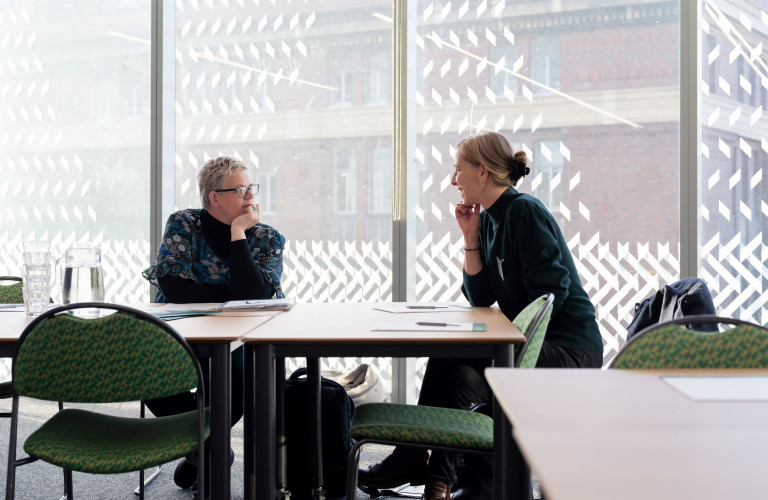Micro-credentials - Secondary Teacher Career Pathway Qualification
The PPTA Learning and Development Centre, in partnership with Te Herenga Waka Victoria University of Wellington, is developing and running professional learning courses aimed at supporting schools to build capability across the sector in the form of micro-credentials.

Contemporary secondary teaching approaches for Aotearoa New Zealand
Effective mentoring practices for secondary teachers in Aotearoa
Working collaboratively and building leadership capability
What is a micro-credential?
Micro-credentials are short courses that allow students to acquire industry-relevant skills and customise career development.
Our micro-credentials are delivered using a blended format, with components including:
- A dedicated online learning portal with access to readings, videos and self-reflection resources
- Facilitated webinar sessions to explore each topic in depth
- A one-day face-to-face hui
The content has been co-designed by subject matter experts using practical skills and knowledge that can be applied and assessed within a professional context.
Each course will be delivered as a 50 hour (5 point) micro-credential, over one school term. The learning has been designed to be recognised in a way that is valuable and can be leveraged to progress future professional learning. The narrow focus of a micro-credential course makes it an ideal addition to your any study commitments.
HEAR FROM OUR COURSE GRADUATES
Contemporary secondary teaching approaches for Aotearoa New Zealand
COURSE ENROLMENT
New in 2024, Contemporary secondary teaching approaches for Aotearoa New Zealand is designed to assist kaiako in gaining a deeper knowledge of effective pedagogical approaches, allowing them to teach confidently and inclusively across all levels of secondary schooling.
Through this course, kaiako will examine contemporary teaching approaches in the context of secondary schools in Aotearoa, such as culturally responsive teaching, inclusive learning, and digital technologies management and utilisation. The framework of the course is underpinned by Mātauranga Māori, ensuring the unique cultural practices that form Aotearoa’s curriculum are reflected in all aspects of the learning.
Thprogramme covers:
- Gender, cultural and neurodivergent identity
- Trauma informed approaches
- UDL and class differentiation
- Restorative practices
- Inquiry learning
- Collaborative learning
- Effective pre-assessment
- Feedback and feedforward
- Depth and complexity
- Metacognition
- Complex thinking
- Connected curriculum
- AI learning opportunities and challenges
You can register your interest in this programme on the VUW course page or by emailing VUW Education Programme Manager Elizabeth Craker – elizabeth.craker@wellingtonuni-professional.nz.
Effective mentoring practices for secondary teachers in Aotearoa
COURSE ENROLMENT
Ngā tikanga whakaaweawe a te kaiārahi mō ngā kaiako kura tuarua ki Aotearoa
Kua whakawhanake a PPTA me Te Herenga Waka i tētahi akoranga mātanga ako hei tautoko i ngā kura ki te whakapiki i te kaha puta noa i te rāngai mā ngā whakaakoranga kaiārahi.
He maha ngā tūranga kaiako e hāngai ana ki te whakaako i ngā hoamahi, i ngā tauira rānei, ā, kua whakaahuatia tā mātou akoranga e taea ai ngā kaiako te ako i ngā pūkenga me ngā āheitanga e hiahia ana rātou kia puta hei kaiārahi.
Ka arotahi tēnei akoranga ki te horopaki o Aotearoa, ā, ka tuitui anō hoki te mātauranga Māori ki tēnei akoranga me ngā tikanga e tika ana, mā te ipurangi, mā te kanohi-ki-te-kanohi rānei.
Effective mentoring practices for secondary teachers in Aotearoa
Many teacher roles involve mentoring colleagues and/or students. Our course is designed to provide an accessible way for teachers to learn the skills and capabilities they need to be effective mentors.
The course has a specific focus on mentoring in the context of Aotearoa: lessons draw upon Matauranga Māori, and appropriate tikanga used in both online and face-to-face interactions.
Topics covered include:
- What is mentoring and why do we need it?
- Effective mentoring approaches, strategies & capabilities
- The impact of context on mentoring
- Mentoring in practice
- Setting up a mentoring programme
A key outcome of this course is enabling schools to establish a high-quality mentoring programme of their own.
Enrollment is open on the VUW course page.
Working collaboratively and building leadership capability
COURSE ENROLMENT
This Master of Education micro-credential designed to support middle leaders to progress their leadership pathways. It was designed by the Learning and Development Centre, in consultation with secondary kaiako and education experts, and is delivered by Te Herenga Waka – Victoria University of Wellington.
The programme comprises six online self-paced modules, three live online webinars, and access to a comprehensive online resource portal offering a range of tailored course content supported by the latest research.
Through this course, kaiako will learn to critically examine Indigenous leadership perspectives and practices in the context of their own school community; identify relevant leadership frameworks and practices and reflect on how they personally demonstrate effective leadership capabilities; and articulate how they demonstrate cultural competencies that enhance working relationships and contribute to a collaborative culture.
The programme covers:
- Characteristics of leadership
- Personal identity – you as a leader
- Collective leadership
- Indigenous leadership frameworks, with a focus on Māori & Pasifika leadership
- Developing leadership in others
- Personal leadership opportunities
- Wellbeing as a leader
- Difficult conversations
You can register your interest in this programme on the VUW course page or by emailing VUW Education Programme Manager Elizabeth Craker - elizabeth.craker@wellingtonuni-professional.nz.
Last modified on Tuesday, 30 January 2024 15:46
